
Humphrey Bogart (as Sam Spade), left, proposes to Sydney Greenstreet (as Kasper Gutman), right, that Peter Lorre (as Joel Cairo), center, take the role of their “fall guy” in the 1941 film “The Maltese Falcon,” based on the novel by Dashiell Hammett. When the “Fat Man” (Gutman) balks, the “gunsel,” played by Elisha Cook Jr. (not shown), ends up taking the rap instead.
KEY TO PLAYING THE ‘BLAME GAME’:
NEVER ADMIT YOU WERE WRONG;
‘SOMEONE ELSE WAS AT FAULT’
Vet. Affairs’ Gen. Shinseki is prime example;
Martin O’Malley & Lt. Gov. Anthony Brown
play the game by blaming state website
HUMPHREY BOGART PROPOSES ‘FALL GUY’
By David Maril
Eric Shinseki’s resignation as Veterans Affairs Secretary is the most recent example of when a problem arises, the accepted practice is to find a scapegoat and make it look as if the situation is being corrected by getting rid of that one person.
It’s easier to replace one person than to go into a complex and dysfunctional system and try to correct the specific issues that are causing the problem.
Years ago in the movie “The Maltese Falcon” Humphrey Bogart tells Sydney Greenstreet they have got to have a “fall guy” to take the blame for the crime and murders.
In sports, when the team flops and the players fizzle, the coach or manager usually goes. It’s easier to make one change than get rid of all the talent that isn’t producing.
This type of culture produces too many leaders, in government and the private sector, who focus only on covering their backs and avoiding blame instead of striving for results and honest accountability.
The VA hospital system problems, with unacceptable delays in health treatment being covered up, were much deeper than Shinseki. His big downfall is that he isn’t a politician.
The former general was an easy target for our babbling and pontificating hacks in Congress, who are the masters of pointing the finger and making noise while doing nothing.
Shinseki, who didn’t want to be a distraction to attempts to fix the problems, did the unusual and accepted the blame.
These days, that’s rare.
FINDING SOMEONE TO BLAME WHEN THINGS FAIL
In the political and corporate worlds, the emphasis too often is taking credit when a venture goes well and finding someone else to blame when things fail.
However, the necessity of finding scapegoats is only part of the strategy. Today we have an updated version of avoiding the blame game that is gaining universal acceptance.
It’s easy.
When anyone questions a bad decision or a faltering policy, you simply say that things would have been even worse if the action hadn’t been taken.
If you are Gov. Martin O’Malley and Lt. Gov. Anthony G. Brown and there’s an embarrassing problem with implementing signups for the Patient Protection and Affordable Care Plan (a/k/a “Obamacare”), you simply blame it on the website computer people.
And — here’s the new twist — you insist that the situation would have been even worse if you hadn’t interceded.
No matter what, you always have an arguing point if you insist things would have been worse if you didn’t do what you did.
Whenever questioned why a bad decision was made, simply answer that you saved the situation from being even worse.
IT WOULD HAVE BEEN A CATASTROPHE…
If pressed for a more specific response, reply that the inside, confidential information you have cited proves it would have been a catastrophe if the measures you took hadn’t been taken.
In politics, this is great for whoever is in power but frustrating for the loyal opposition.
Before former President George W. Bush became unpopular at the end of his second term, he could shrug off public outrage over the realization of Iraq’s not possessing weapons of mass destruction when we went to war: All he had to do was insist terrorism would have increased in the Middle East if we had not invaded.
When the Democrats took over the White House, the shoe was on the other foot: Republicans kept insisting the Democrats were making the economy worse by too much spending and not giving enough tax breaks. Democrats answered, that conditions would have deteriorated without their policies.
How do you prove or disprove whether a difficult situation would be even worse if a particular action hadn’t been taken?
We all have to cope with this philosophy.
What do you say after you question why your investment portfolio is doing poorly and your broker says that you would have needed to declare bankruptcy if it hadn’t been managed the way it was?
TAKING ADVANTAGE OF THESE TYPES OF EXCUSES
It’s hard not to start taking advantage of these types of excuses yourself.
Next time you are criticized for reporting half-an-hour late for work, tell the boss that if it hadn’t been for your driving skill, resourcefulness and determination you would have been two hours late because of the terrible traffic.
If a decision you make ends up costing the company extra money, you can claim it would have been more costly if the move hadn’t been taken.
You can even turn it around when criticized for not taking action. You simply state that the outcome would have been far worse if you had been decisive and made a move.
Apparently if they can’t prove you wrong, you are always right.
And if they can prove you wrong, then you just go out and find a scapegoat to take the blame.
davidmaril@voiceofbaltimore.org
“Inside Pitch” is a weekly opinion column written for Voice of Baltimore by David Maril.
CHECK OUT LAST WEEK’S “INSIDE PITCH” COLUMN: click here
…and read archived Dave Maril columns by clicking here.






June 7th, 2014 - 2:14 AM
[…] Voice of Baltimore by David Maril. CHECK OUT LAST WEEK’S “INSIDE PITCH” COLUMN: click here …and read archived Dave Maril columns by clicking here. […]